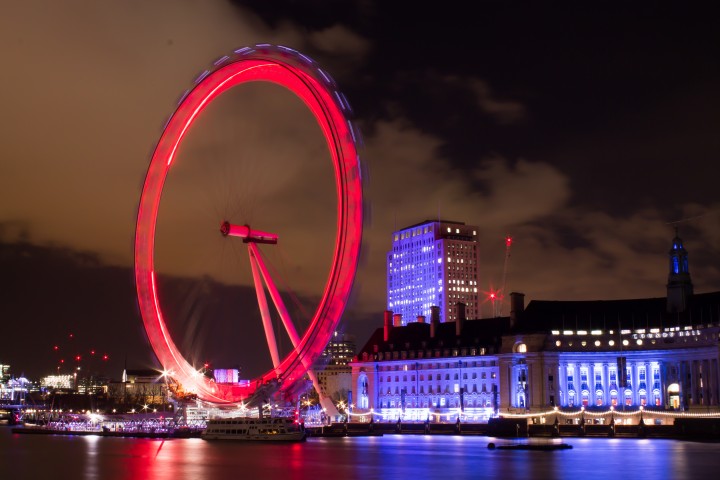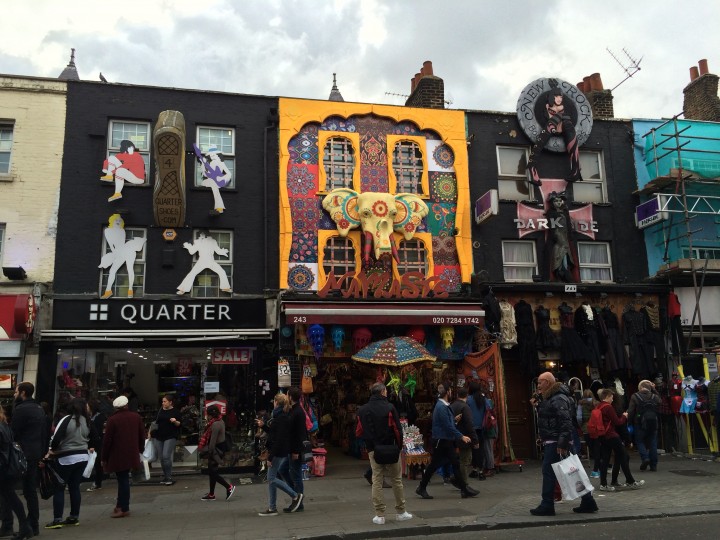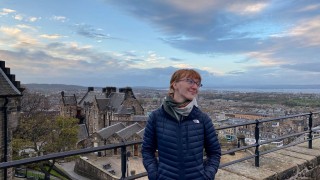Study major works of English and Anglophone literature in a London context. Learn from Columbia faculty whose work engages the city's literary culture. View London as your classroom through regular outings to urban sites. Experience British university life and pursue your academic interests at the prestigious Queen Mary University of London!
We will hold a virtual info session for the program on Friday February 6th from 12-1pm. Please register here to attend and/or receive the recording afterwards.
Program Overview
The Columbia University in London Program, under the direction of Columbia's Department of English and Comparative Literature, is in partnership with Queen Mary University of London (QMUL). The program is offered in the fall term and is open to Columbia and Barnard undergraduates from all disciplines.
One faculty member from Columbia's English and Comparative Literature department leads the program. That faculty member crafts and teaches a version of the program's Global Seminar, London as Literature, that draws upon their areas of expertise. The Global Seminar gives you the opportunity to study and contextualize literary texts in their immediate geographical and cultural settings. This allows you not only to deepen your understanding of the works, but also the city itself.
In addition to the Columbia-taught Global Seminar, you enroll in three QMUL courses. QMUL offers coursework across a broad range of disciplines, including physical and natural sciences, engineering, humanities, and social sciences.
Eligibility and Application
- Must be a currently enrolled undergraduate student in good academic and disciplinary standing at Columbia University or Barnard College
- Must have a minimum 3.0 cumulative GPA. Students must also maintain a 3.0 GPA during the semester before going abroad.
- All qualified students are welcome to apply for the program. Students do not need to major in English and Comparative Literature, but they should demonstrate the motivation to study the topic taught in the global seminar.
HOW TO APPLY
Want to apply? Click the “Apply Now” button above. If the button doesn't appear above, the program is not yet accepting applications. You will be asked to set up a short profile, which will allow us to send you relevant information about your application. Once you’ve created a profile, you will see a checklist of items that you will need to submit. These generally include:
- Application questionnaire(s)
- Personal Statement
- Letter of recommendation from someone who has taught you at the university level who can attest to your academic skills
- Official transcript(s)
Academics
The required course load for the Columbia University in London Program is 16 points, which is equal to approximately four courses. All students are required to enroll in the Columbia Global Seminar (4 CU points) and complete the remaining 12 points at Queen Mary. To complete your academic program, you select courses from Queen Mary University of London's (QMUL) expansive course offerings. You will take a total of 45 credits at Queen Mary, which usually means enrolling in 3 QMUL courses as most are worth 15 QMUL credits each. Fifteen QMUL credits are the equivalent of four CU points.
Please see more about the Columbia Global Seminar and QMUL course offerings in the drop-down sections below.
The University reserves the right to withdraw or modify the courses of instruction or to change the instructors as may become necessary.
FALL 2026 GLOBAL SEMINAR
The Global Seminar topic changes each year based on the research and teaching interests of the Columbia faculty member who will be teaching in a given semester.
The Fall 2026 Global Seminar will be: London Hellenism and the Modern Imagination: Enlightenment to Postmodernity. 4 points.
Instructor: Stathis Gourgouris, Professor of Classics and of English and Comparative Literature, Department of Classics
In this Columbia seminar taught at Queen Mary University of London, this course reopens the long-term debate on the symbolic significance of things “Hellenic” in the construction of European modernity, with Britain primarily the focus. Covering a range from the Enlightenment and Romanticism to colonial, imperial, and contemporary manifestations, we will examine texts that are either derived from or respond to the Hellenic, whether as mimetic ideal, symbolic inspiration, narrative location, or occasion for cultural reflection. We will explore ways in which the “Greeks” have been constructed in various national and historical contexts through explicit figurations, interpretations, or incarnations of the Hellenic, including the self-constructions of contemporary Greeks as response to European Philhellenism.
Theoretical and hermeneutical emphasis will be placed on the relation between aesthetics and politics from the Age of Revolution to the Age of Empire, from the early national and colonial imagination to contemporary ‘Culture Wars’. Questions of canon formation, tradition, innovation, and cultural intersection/influence will also be prominently addressed. Material will be drawn primarily from literature and philosophy, but will also include historiography, art history, travel literature, theater, and political theory. The city of London is a living treasure of innumerable traces of this whole trajectory, which we will explore in complementary visits separate from the seminar sessions. This course will include immersive collaborative learning, with hands-on practicum fieldwork experience.
Pending approval by the Committee on Instruction and Committee on the Global Core
FALL 2025 GLOBAL SEMINAR
The Global Seminar topic changes each year based on the research and teaching interests of the Columbia faculty member who will be teaching in a given semester.
The Fall 2025 Global Seminar will be: Postcolonial London. 4 points.
Instructor: Joseph Slaughter, Department of English and Comparative Literature
In this Columbia seminar taught at Queen Mary University of London, we will consider London as a postcolonial metropolis, former seat of empire, and an important site in the transatlantic slave trade. Primary course texts will include novels, plays, films, and poetry by writers who migrated (or were born to migrants) from the West Indies, Africa, and South Asia, who reside(d) in London and made it the setting of their work.
Taking London as a focus for postcolonial literature allows us to consider the mid-twentieth century history of decolonization from the vantage point of the former imperial center. Some of the writers we'll read arrived in London between 1948 and 1981—that is, between two iterations of the British Nationality Act, the first of which opened British citizenship to colonial subjects, and the second of which established restrictions on immigration from the former colonies that had been imposed in the 1960s and 70s. “Postcolonial London” has thus been shaped by the history of empire and decolonization, these waves of migration, and resistance to them. We'll consider the importance of the “Windrush generation”—writers from the West Indies who began to arrive in 1948 to rebuild postwar Britain—to the tradition of "Black British" writing, as well as the work of later arrivals and second-generation writers.
In addition to written literature, we will also study select films and nonfiction accounts of London written during London's long imperial heyday, by Olaudah Equiano and Ignatius Sancho in the late 18th century, C.L.R. James in the early 1930s, and more recent reflections on postcolonial London. These accounts by colonized and postcolonial subjects will complement our in situ consideration of London as both imperial center and postcolonial metropolis, through site visits and attendance at theatrical performances.
Previous GLOBAL seminars
Previous seminars have included:
- Fall 2024: UnLondon: Writing (and Re-Writing) Urban Space with Professor Matt Hart
- Fall 2023: London as Literature: The Early Modern City with Professor Alan Stewart
- Fall 2022: London: Fictional and Real with Professor Edward Mendelson
- Fall 2019: Creating Shakespeare with Professor James Shapiro
- Fall 2018: London in Postcolonial Fiction with Professor Jennifer Wenzel
- Fall 2017: London Theater from 1590 to 2017 with Professor Jean Howard
- Fall 2016: Reading London: English Literature and Its Archive with Professor Molly Murray
Queen Mary University of London Course offerings
A unique feature of this innovative program is the opportunity to experience the British university system. While at Queen Mary University of London, you will study alongside matriculated QMUL students.
To explore QMUL's module offerings (i.e. course offerings), please visit the QMUL Directory of Modules. You should filter by Associate Modules, which are those which are open to visiting students. This page of the QMUL website will help you understand more about taking coursework at QMUL as a visiting student.
With respect to your QMUL coursework, you take a total of 45 QMUL credits. This usually means you will enroll in three QMUL courses as most are worth 15 QMUL credits. Fifteen QMUL credits are the equivalent of four Columbia points.
QMUL offers coursework in the following subject areas:
- Astronomy and Astrophysics
- Biological and Chemical Sciences (Chemistry, Environment, psychology, genetics, biochemistry)
- Computer Science (database systems and applications, graphics, multimedia)
- Economics (finance, management, statistics and mathematics)
- Electronic Engineering
- Engineering and Materials (Aerospace, Mechanical, Medical, Sustainable Energy, Materials, Design and Innovation)
- English
- Drama (text and performance based modules)
- Film and Communications (includes scriptwriting and production)
- Geography (Environment and human geography)
- History (includes Art and Architectural History)
- International Relations
- Languages Learning Unit (includes French, German, Japanese, Italian)
- Linguistics
- Mathematics
- Modern Languages (French, German, Italian, Portuguese, Russian, Hispanic Studies, Art and Architectural History, European Literature and Cultural Studies, Latin American Literature and Cultural studies, Linguistics)
- Physics (includes Astronomy and Astrophysics)
- Politics (includes international relations and globalization)
- Psychology
Note: Columbia cannot provide credit for any courses taken at professional schools.
Academic Schedule
The Columbia Global Seminar is held once a week, with accompanying course excursions. Timetables for local university courses are scheduled by Queen Mary University of London, and the schedule for your Seminar will be shared by the Columbia Professor before your departure.
GRADES AND TRANSCRIPTS
Click here for the Columbia semester program grading policies.
Columbia students: Grades appear on SSOL and your transcript any semester grades from courses taken at Columbia. For more information, please see the section on Academic Credit in Steps to Study Abroad.
Barnard students: Grades appear on eBear and your transcript as any semester grades from courses taken at Barnard. For more information, please see the section on Credit and Transcripts for Barnard Students on our Barnard student pages.
Life in London
Housing
Students live in on-campus Queen Mary University of London housing located on campus with other full degree or international students. Accommodations are self-catered apartments, or flats, suited for 4-10 students. Students have single bedrooms with a shared kitchen and dining-area. Please visit QMUL's website on housing for more information. Please note that student are required to live in QMUL accommodations.
Meals
Students are responsible for their own meals. You can purchase food at nearby grocery stores and cook for yourself. You can also eat in the many local restaurants and cafes, some of which are on Queen Mary University of London’s (QMUL) campus. QMUL offers a meal plan option during semester week days.
Activities
England_London_CU in London_Fall 2016_Ticket in front of the Globe Theater.jpg

Ticket for Macbeth at The Globe Theater
Kirby Eckels, BC'18
The Columbia Global Seminar includes guided field trips designed to provide a deeper understanding of the readings and classroom discussions. The QMUL Global Opportunities Office organizes events and activities throughout the semester. Past events included walking tours, football (soccer) matches, and visits to museums and galleries.
You are encouraged to explore and participate in the more than 60 clubs, societies, and volunteer opportunities offered through the QMUL Student Union. Joining a club is a great way to meet local students and discover all London has to offer!
Daily Living and Schedule
The daily schedule will vary person to person, depending on the classes you take. The Columbia Global Seminar usually meets on Tuesdays, with course excursions occur on Wednesday afternoon/evening or other evenings as scheduled.
The U.K. university system differs from the U.S. university system in that modules (e.g. classes) may meet fewer times a week and/or for fewer hours. However, you are expected to supplement your learning with independent reading and research in your free time.
Location
Queen Mary University of London (QMUL) is located in the Mile End neighborhood of East London, a vibrant and desirable location for the city's growing and diverse population of young professionals and students. The campus, situated in the heart of London, is close to local landmarks such as Queen Elizabeth Olympic Park, Tower Bridge, and Brick Lane. The Barbican Center, West End, Parliament, Royal Parks and Palaces, and London's incredible wealth of other cultural and historical attractions, are short journeys away by bike, bus, or Tube. When you’re in need of greenery, the campus’ location along the Regent Canal between Victoria and Mile End parks provides the perfect setting.
England_London_QMUL Canal.jpg
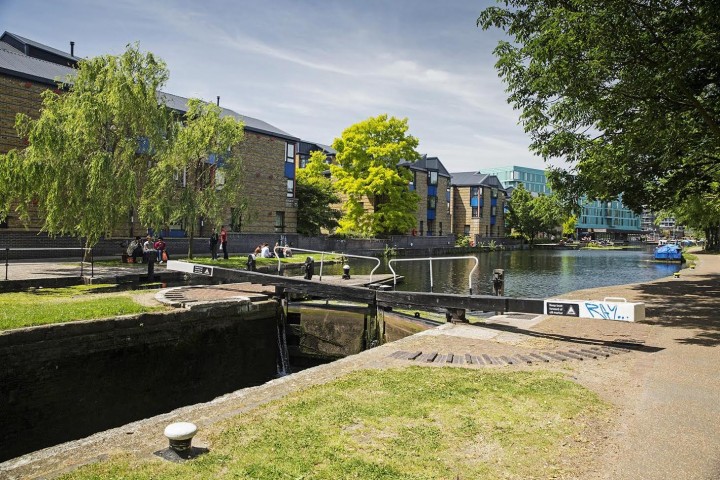
Canal alongside Queen Mary University of London
Queen Mary University of London has a long and robust history as an institution of higher learning. It was founded in 1887 as the People’s Palace, a philanthropic center providing educational opportunities to east Londoners. A rising star among the UK’s Russell Group of research-centered universities, QMUL compares well with Columbia in its curricular structure and in its identity as an international university in an historic global city. Fully 20% of QMUL’s students come from 125 countries outside the UK. QMUL awards degrees at the undergraduate, master, and doctoral levels.
People
England_London_CU in London_Fall 2016_Eckles, Kirby_St Pauls Cathedral.jpg
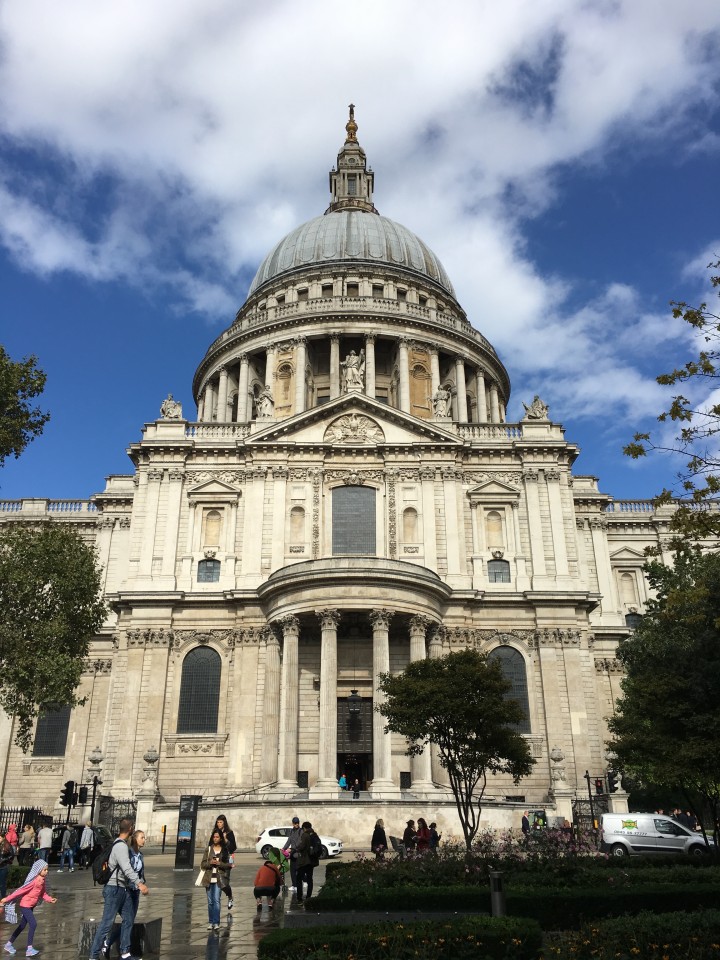
St. Paul's Cathedral
Kirby Eckels, BC'18
Stathis Gourgouris (Fall 2026 Faculty Director, London Hellenism and the Modern Imagination: Enlightenment to Postmodernity.)
England_London_CU in London_Fall 2016_Eckles, Kirby_St Pauls Cathedral.jpg

St. Paul's Cathedral
Kirby Eckels, BC'18
Joseph R. Slaughter (Fall 2025 Faculty Director, Postcolonial London.)
Financial Considerations
Many students use a combination of federal student aid and home school grants to fund their undergraduate studies. Many, if not most, of these funds are applicable to studying abroad for a semester or academic year. The costs of studying abroad during the semester or academic year are frequently comparable to those of staying on campus.
All students should work with their home school financial aid office to determine what aid is available for studying abroad.
Please see below for the cost breakdowns for detailed information on all program-related expenses:
Program Costs Fall 2024:
Program Costs Fall 2025:
Financing Your Studies in London
For more information and resources on financing your time abroad, please see the pages below:
WITHDRAWAL & REFUND POLICY
If you decide to withdraw from the program after confirming your participation, please be aware of the financial consequences and the office policies by reviewing the Withdrawal and Refund Policy here.
Find Out More
Speak to an Adviser: Want to learn more? Make an appointment to chat with the adviser for this program! You can also email them with any questions, or to arrange a meeting if you are unable to make the listed times.
Applying: Make sure to review the dates and deadlines section at the bottom of the page.
Resources: View our Steps to Study Abroad page to see advice on Where to Begin, how to Prepare to Go, and what you need to know when Returning from Abroad. We will share many resources with you throughout the application and pre-departure process for preparing to study abroad.
We recommend reviewing the following before you apply:
Having a valid passport is one of the key components of going abroad. See more on our Passports and Visas page.
Need help deciding which semester, program, and experience are right for you? Check out our Choosing a Study Abroad Program page.
Learn about finances and study abroad on our Financial Considerations page.
If considering summer study abroad, review guidance on our Summer Study Abroad page.
Plan ahead and prepare for your health, well-being, and accessibility abroad by reviewing our Well-Being Abroad resources and Identity and Diversity Abroad page.
Once accepted, make sure to review the Prepare to Go page for more resources and information about preparing for your experience abroad.
